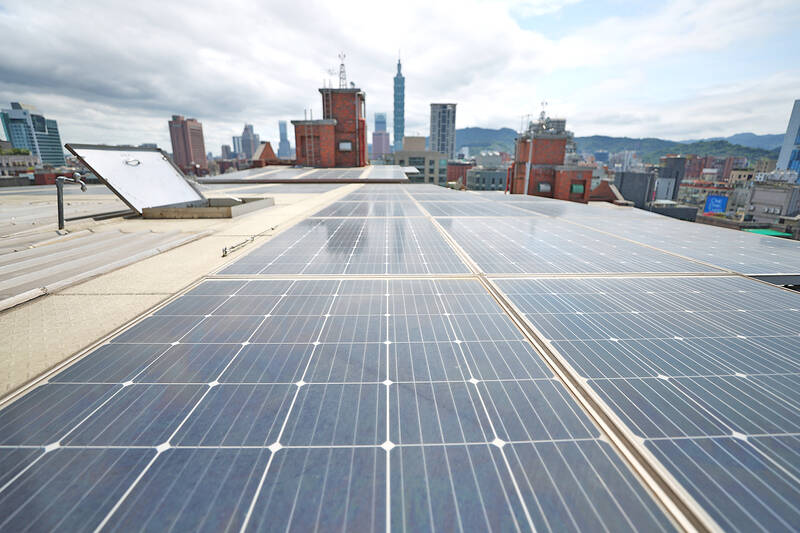The Ministry of Economic Affairs yesterday unveiled new renewable energy feed-in tariffs (FIT) for this year with the steepest cuts of up to 6 percent for solar panel installations, given lower manufacturing costs and better efficiency.
It also came after more than 30 percent of solar energy operators sold the power to private businesses at a higher rate of NT$5 per kilowatt-hour rather than the FIT rates granted by the government, the ministry said.
The ministry said it kept unchanged the FITs for solar systems with capacity smaller than 10kW at NT$5.7055 per kilowatt-hour, with an aim of encouraging households and small businesses to install rooftop solar panels. The tariff for this category is to drop 1.36 percent in the second half of the year, matching the broader downward trend of solar panel FITs.

Photo: CNA
The FITs for other renewable energy installations including onshore and offshore wind farms as well as hydroelectric power plants remain the same as the rates last year, the ministry said.
The ministry also set the FITs for micro hydro generators with capacity of less than 100kW at NT$4.9548 per kilowatt-hour, it added.
Local solar cell manufactures last month called on the ministry to maintain the FITs for solar energy installations, saying many solar cell makers are struggling to turn a profit due to weak domestic demand.
In response, the ministry yesterday said it had thoroughly considered all factors before reaching the final decision.
The FIT for large-scale ground-mount solar panels would see the biggest reduction of 5.91 percent this year to 3.5037 per kilowatt-hour, while floating solar panels came next with a reduction of 5.48 percent to NT$3.8948 per kilowatt-hour.
The tariff for rooftop solar panels with capacity ranging from 100kW to 500kW would fall 5.14 percent to NT$3.7152 per kilowatt-hour, marking the third-largest cut among all categories, the ministry said.
The FIT for marine energy would be flat at NT$7.32 per kilowatt-hour, the highest among all renewable energy, it said, adding that the first marine power plant is set to launch later this year.
The FITs for geothermal, biomass energy and waste-to-energy installations would remain unchanged, ranging from NT$2.8066 to NT$7.32 per kilowatt-hour, the ministry said.

BYPASSING CHINA TARIFFS: In the first five months of this year, Foxconn sent US$4.4bn of iPhones to the US from India, compared with US$3.7bn in the whole of last year Nearly all the iPhones exported by Foxconn Technology Group (富士康科技集團) from India went to the US between March and last month, customs data showed, far above last year’s average of 50 percent and a clear sign of Apple Inc’s efforts to bypass high US tariffs imposed on China. The numbers, being reported by Reuters for the first time, show that Apple has realigned its India exports to almost exclusively serve the US market, when previously the devices were more widely distributed to nations including the Netherlands and the Czech Republic. During March to last month, Foxconn, known as Hon Hai Precision Industry

Taiwan Semiconductor Manufacturing Co (TSMC, 台積電) and the University of Tokyo (UTokyo) yesterday announced the launch of the TSMC-UTokyo Lab to promote advanced semiconductor research, education and talent development. The lab is TSMC’s first laboratory collaboration with a university outside Taiwan, the company said in a statement. The lab would leverage “the extensive knowledge, experience, and creativity” of both institutions, the company said. It is located in the Asano Section of UTokyo’s Hongo, Tokyo, campus and would be managed by UTokyo faculty, guided by directors from UTokyo and TSMC, the company said. TSMC began working with UTokyo in 2019, resulting in 21 research projects,

Taiwan’s property market is entering a freeze, with mortgage activity across the nation’s six largest cities plummeting in the first quarter, H&B Realty Co (住商不動產) said yesterday, citing mounting pressure on housing demand amid tighter lending rules and regulatory curbs. Mortgage applications in Taipei, New Taipei City, Taoyuan, Taichung, Tainan and Kaohsiung totaled 28,078 from January to March, a sharp 36.3 percent decline from 44,082 in the same period last year, the nation’s largest real-estate brokerage by franchise said, citing data from the Joint Credit Information Center (JCIC, 聯徵中心). “The simultaneous decline across all six cities reflects just how drastically the market

Ashton Hall’s morning routine involves dunking his head in iced Saratoga Spring Water. For the company that sells the bottled water — Hall’s brand of choice for drinking, brushing his teeth and submerging himself — that is fantastic news. “We’re so thankful to this incredible fitness influencer called Ashton Hall,” Saratoga owner Primo Brands Corp’s CEO Robbert Rietbroek said on an earnings call after Hall’s morning routine video went viral. “He really helped put our brand on the map.” Primo Brands, which was not affiliated with Hall when he made his video, is among the increasing number of companies benefiting from influencer